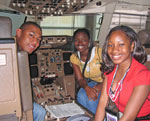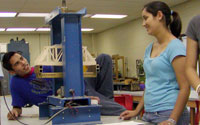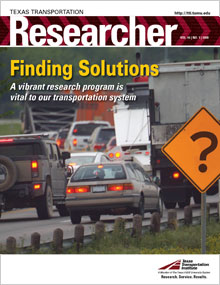
At any given time, 200 students are employed by the Texas Transportation Institute (TTI). Most of them, either graduate or undergraduate, are working on actual research projects funded by the Texas Department of Transportation (TxDOT), Federal Highway Administration and research programs administered by the Transportation Research Board (TRB) and other sponsors.
TTI supplies the vital hands-on experience that gives the students an edge in the competitive employment race, and the students have become a vital part of the transportation research process. This symbiotic relationship works well for both parties, but the real winner is anyone that relies on the advancement of transportation to improve the way they live — in other words, each and every one of us.
“Without TTI hiring students to help with research projects, students would begin their career with less practical experience and less professional preparation,” says Gene Hawkins, associate professor in the Department of Civil Engineering at Texas A&M University. Hawkins also serves as a research engineer at TTI. According to Hawkins, “the practical and professional lessons learned through student participation in TTI research mean that these students can make a more immediate contribution to the transportation profession upon graduation.”

As any supervisor can tell you, learning on the job costs money. When tomorrow’s professionals get real-world experience at school, the training pays dividends for the rest of their careers. And, in the case of graduates who go on to serve in the public sector, that investment saves taxpayers real dollars. More experience also means better decisions, and better decisions mean a safer and more reliable transportation system.
TTI’s Jerry Ullman, senior research engineer, echoes Hawkins’ feelings. Ullman has worked with students on numerous research projects during the past 20 years. “The students are as crucial to us as we are to them,” Ullman says. “Today’s students are tomorrow’s transportation leaders, and the relationships we establish with the students while they are here often continue throughout their careers.”
Alex Borgan, an undergraduate student working on a research project in TTI’s Signs and Markings Program, says his resume caught the eye of his future employer. “The transportation design firm that I’ll work for when I graduate knows of TTI,” Borgan says. “The research experience I’ve received has allowed me to see the big picture, not to mention the fact that it helped me enhance my education and my value to an employer.”
Hawkins says that one of the most important roles TTI plays is to inspire young people to get involved in transportation as a profession. “It is a great feeling to see these students get excited about their future career, especially when they want to work in the transportation field,” Hawkins says. “The faculty and TTI researchers obviously have the power to impact these students’ lives. The research work experience that our students gain at TTI is the icing on the cake that builds upon the lessons they learned in the classroom. And it certainly gives them a head start on their careers.”
Some would argue that inspiring the next generation of transportation professionals is the most important educational impact TTI has. A recent TRB study suggests that as much as 50 percent of the transportation professionals at state agencies will be eligible for retirement soon. Programs like TTI’s Summer Transportation Institute, Go Girl! and On the Move are all designed to get young people interested in transportation jobs ranging from construction to research.
“These programs have a successful record in motivating middle school and high school students at a time when they are getting interested in a possible career,” says TTI Associate Research Scientist Debbie Jasek, who has coordinated all the programs. “Without these programs, it’s safe to assume that most of the students would never have the opportunity to even consider a career in transportation.”
TTI Research Engineer Paul Krugler has a unique perspective about the impact that student researchers have on transportation. Before coming to TTI, Krugler was the director of the Research and Technology Implementation Office at TxDOT. “Having students work on research projects is not only good for TxDOT and TTI during the research. Overall transportation improvements are the end result,” Krugler says. “It is truly a win-win situation.”

